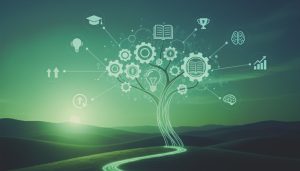Market trends and technological skills indicate that the growth of the global technology market has created a need for new skills in our jobs. As a result, areas of the technology market, such as automation and AI, are continuously growing in size and require new types of skills; meanwhile, other demands for the rest of the jobs are shrinking.
The cloud computing market in Europe is estimated to reach 560 billion euros by 2030. AI is expected to grow to $407 billion by the end of 2027, and cybersecurity is projected to reach $424.97 billion by 2030. The tech jobs market is responding to our needs for digitalisation, continuous development, and support of existing technologies.
According to a McKinsey paper on the future of work in Europe, many of the jobs that employers might need to fill by 2030 require a higher level of skill, and fast-growing occupations like software and application developers may need specialised skills.
Cloud computing tech skills
Our need for remote access, monitoring data flow, and data storage made cloud computing a highly demanded technical capability in the global job market. Due to remote and hybrid work requirements, cloud technology impacted us both as employees and as daily consumers.
Cloud technology is about infrastructure, servers, storage, networking, databases, operating systems, and data security. Organisations are using cloud infrastructure to manage scalability and cost reduction. Also, cloud security protects data with encryption and compliance measures.
With the rise of artificial intelligence (AI) and machine learning (ML) embedded in cloud services, most companies are planning AI adoption and use of hybrid environments – both public and private data centres. Cloud experts are in demand because businesses seek AI-enabled, cloud and machine learning solutions to solve their problems and remain competitive.
Demand for cloud professionals is estimated to rise by about 25% in 2025 globally, mostly because of AI and machine learning integration within the cloud. Jobs like cloud architect, cloud developer, database developer, and network engineer require skills related to designing, monitoring, and automating processes and workflows of cloud infrastructure.
To work in cloud computing, apart from usual programming skills, you will need specific cloud skills such as migrating data, systems architecture and design, monitoring system performance, networking, serverless computing and containers, scaling, AI and ML cloud services, security encryption, etc. Cloud providers offer free courses on their platforms that can help you get certified or specialised in this field.
Cybersecurity Tech skills
Different technologies are evolving and changing, but so is the need for skilled people to provide network and software systems safety. Along with cloud technologies, remote work, and new AI models, cyber cybersecurity skills gap has increased. Due to multi-cloud and AI integration, cybersecurity expertise has become more valuable.
Cybersecurity is a broad domain and deals with network security, data encryption, cyber-attacks, system infrastructure, IT standards, risk and compliance. Some of the highly demanded roles related to cybersecurity are cybersecurity engineer, network security engineer, or chief information security officer (CISO).
Skills and experience for these roles are in cloud security, network security, operating systems, encryption techniques, identity access management, scripting and programming languages, and IT standards like ISO 27000 series or NIST SP.
For obtaining cybersecurity jobs or career development, formal certifications might be an advantage. Consequently, some cybersecurity certifications are required by institutions or governmental agencies as mandatory recruitment selection criteria, but there are also free courses available.
Artificial Intelligence (AI) skills
AI adoption is expanding fast across finance, manufacturing, retail, telecom, and automotive industries. The challenges and complexities of creating AI software make tech AI-related skills valuable for companies. Some of the highly demanded AI jobs are data scientists, machine learning engineers, and robotics engineers.
Among the skills and knowledge critical in developing AI models and applications are programming languages (Python, Java, R, Julia and C++), machine learning techniques, natural language processing (NLP), big data, algorithms, and AI frameworks. For roles like machine learning engineer, there are free certifications and also free courses on AI tools.
So, one technology change led to another and set off a chain reaction affecting our lives and jobs. Technology and socio-economic trends will always be a challenge for each of us. Hopefully, these waves of change will become growth opportunities, and we’ll succeed in transforming them into new capabilities.
EU AI Act and AI system risks
Studies show us that more companies are heading toward the adoption of AI. AI models have raised a lot of ethical problems and face challenges in integrating with the existing processes. Ultimately, the AI industry will evolve, and we’ll have to adapt, learn and integrate it into our daily working routine.
European authorities adopted regulations on the developing AI industry through the EU AI Act to be better safe than sorry. To avoid risks AI can generate and people to safely use it EU published the Artificial Intelligence Act. The regulations’ objective is to ensure safety and compliance with fundamental human rights.
The new rules affect HR processes like selection and recruitment, performance assessments and the contractual relationships between employees and employers. HR needs to implement frameworks to address the AI systems classified as high-risk. Moreover, AI challenges will impact all employment relationships involving discrimination bias, data protection or privacy rights.
Overall, the EU AI Act limits the use of biometric identification systems by law enforcement and bans social scoring. Also, it diminishes AI systems’ possible usage to exploit users’ vulnerabilities and promotes the right to initiate complaints and receive explanations.
Great Expectations from Technological Innovations
Generally, the main trend is the integration of IoT networks, AI, and Big Data into manufacturing and industrial processes. Technology is enabling changes in education, the financial system, and global supply chains and automating most industries. New forms of social entertainment are emerging in the metaverse, virtual reality (VR) and augmented reality (AR).
We witness constantly that wearable tech is periodically upgraded with the scope of improving and transforming our experiences. Technology changed the way we communicate, and it will impact more and more of our lifestyle and transform our behaviours. Balancing tech evolution with the protection of jobs will be a complex challenge as new waves of innovation emerge.
Furthermore, technology’s domination is spreading across every aspect of our lives. From climate change to ageing with grace and dignity, technological innovations have the power to transform our daily experiences. Anticipations are to see more AI-driven tools for automated workflows and real-time data processing on the market.
So, due to the market trends and tech skills current evolution, we expect new tech solutions for renewable energy, medical breakthroughs for incurable diseases, transportation through space, and environmental issues.
High-tech innovations and AGI can be a magic key for navigating humanity’s challenges, or, on the contrary, they might prove to be our doom, depending on how we use them. It will depend on how we put into practice our values, morality and ideals. It will most likely be an ethical choice with long-term effects for our future as a society.




